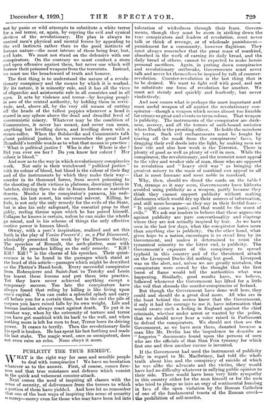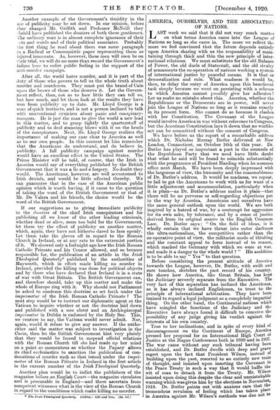PUBLICITY THE TRUE REMEDY.
WHAT is the right way for sane and sensible people to deal with conspiracies ? We have no hesitation whatever as to the answer. First, of course, comes firm- Peas and that true resistance and defence which consist in the quick and vehement counter-attack. Next comes the need of inspiring all classes with the sense of security, of deliverance from the terrors to which a portion of them have yielded. And here let us remember that one of the best ways of inspiring this sense of security
merey—mercy even for those who may have been led into toleration of wickedness through their fears. Govern- ments, though they must be stern in 'striking down the true conspirators and leaders of revolution, must never talk or think of revenge, or of wholesale punishment— punishment for a community, however flagitious. They must always remember that the great mass of mankind, absorbed in the work of earning its daily bread, and the daily bread of others, cannot be expected to make heroic personal sacrifices. Again, in putting down conspiracies and revolutionary outbreaks, Governments must never talk and never let themselves be inspired by talk of counter- revolution. Counter-revolution is the last thing that is to be desired. We want to fight evil with good, and not to substitute one form of revolution for another. We must act sternly and quickly and fearlessly, but never vindictively.
And now comes what is perhaps the most important and most useful weapon of all against the revolutionary con- spirator—though a weapon which seems almost too humble for crimes so great and events so tremendous. That weapon is publicity. The instruments of the conspirator are dark- ness, secrecy, and all the terrors of oath-bound societies where Death is the presiding officer. He holds the members by terror. Such evil enchantments must be fought by tearing off the mask from the conspirators' faces, by dragging their evil deeds into the light, by making men see how vile and also how weak is the Terrorist. There is plenty of good as well as plenty of evil in men. While the conspirator, the revolutionary, and the terrorist must appeal to the viler and weaker side of man, those who are opposed to revolution and " heavy civil war" as bringing the greatest misery to the mass of mankind can appeal to all that is most humane and most noble in mankind.
Why, then, should we dread the cards on the table ? Yet, strange as it may seem, Governments have hitherto avoided using publicity as a weapon, partly because they think they cannot support publicity without making disclosures which would dry up their sources of information, and still more because—as they say in their fretful bare— "It might cause a panic, and that would be the worst of evils." We ask our readers to believe that these arguments against publicity are 'pure conventionality and claptrap where they are not actually inspired by fear. As we have seen in the last few days, what the conspirator hates more than anything else is publicity. On the other hand, what gives hope to a nation, encourages it to stand firm by its Government, and makes it determined to resist the tyrannical minority to the bitter end, is publicity. The Government's exposure of the conspiracy to spread typhoid in this country and of the threatened attack on the Liverpool Docks did nothing but good. Liverpool was on the alert, and, unless we are greatly mistaken, the conspirators were cowed by the thought that the first burst of flame would tell the authorities what was happening. Similarly, good results have, we believe, followed whenever the Government has lifted for a little the veil that shrouds the murder-conspiracies of Ireland.
But though the Government have done well here, they could and should do a great deal more. All who are in the least behind the scenes know that the Government, if only it had the courage to use it, have information that would create such a feeling in England against the chief criminals, whether under arrest or wanted by the police, that we should never hear a voice raised in Parliament to defend the conspirators. We should not then see the Government, as we have seen them, daunted because a man like Mr. Devlin has the 'impudence to describe as " forgeries " documents found upon the persons of men who are the officials of that Sinn Fein tyranny for which first one and then another excuse is invented.
If the Government had used the instrument of publicity fully in regard to Mr. MacSwiney, had told the whole truth about him and the conspiracy of suicide of which he was alike the advocate and the victim, they would have had no difficulty whatever in rallying public opinion to their side. There would have been very little sympathy in this country either for the man himself or for the men who tried to plunge us into an orgy of sentimental humbug in face of the open violation by the Roman Catholics of one of the fundamental tenets of the Roman creed— the prohibition of self-murder.
Another example of the Government's timidity in the use of publicity may be set down. In our opinion, before they charged Mr. Griffith and Professor McNeill they should have published the dossiers of both these gentlemen. The ordinary man is in almost complete ignorance of their -As and words and of their political associates. Probably the first thing he read about them was some paragraph in a Radical or Communistic paper representing them as injured innocents. As, however, these men will soon be on their trial, we will do no more than record the Government's failure here to enlist public feeling in the support of the anti-murder campaign.
After all, the world hates murder, and it is part of the duty of those who govern to tell us the whole truth about murder and murderers. They must put the brand of Cain upon the brows of those who deserve it. Let the Govern- ment reflect, then, not as to how little they can tell us, but how much, and let them look at the results they have won from publicity up to date. Mr. Lloyd George is a man of quick instincts, and is not a person inclined to talk with conventional cynicism about panic and conspiracy- mongers. He is just the man to give the world a new lead in this matter, and to grasp tightly the quarterstaff of publicity and to deal stunning blows with it on the heads of the conspirators. Next, Mr. Lloyd George realizes the importance of making our case clear to America as well as to our own people. In this context let him remember that the Americans do understand, and do believe in, publicity. A full publicity campaign against murder would have an excellent effect in the United States. The Prime Minister will be told, of course, that the Irish in America would say of everything published by the British Government that it was a lie and a forgery. No doubt they would. The Americans, however, are well accustomed to Irish denials, and would be little affected thereby. We can guarantee that in the case of the American public opinion which is worth having, if it came to the question of taking the word of the British Government or that of Mr. De Valera and his friends, the choice would be the word of the British Government.
If our suggestions as to giving immediate publicity to the dossiers of the chief Irish conspirators and for publishing all we know of the other leading criminals, whether dead or alive, seem too bold for the Government, let them try the effect of publicity on another matter, which, again, they have not hitherto dared to face openly. Let them take the gloves off in regard to the Roman Church in Ireland, or at any rate to the extremist portion of it. We showed only a fortnight ago how the Irish Roman Catholic Primate and his Censor allowed, and so became responsible for, the publication of an article in the Irish Theological Quarterly* published by the authorities of Maynooth, which in effect made killing no murder in Ireland, provided the killing was done for political objects and by those who have declared that Ireland is in a state of war with Great Britain. The British Government can, and therefore should, take up this matter and make the whole of Europe ring with it. Why should not Parliament be asked to condemn this doctrine as set forth under the imprimatur of the Irish Roman Catholic Primate ? The next step would be to instruct our diplomatic agent at the Vatican to inquire whether or not the doctrine laid down and published with a non obstat and an Archiepiscopal imprimatur in Dublin is endorsed by the Holy See. This, we venture to say, the Vatican would never admit. Nor, again, would it refuse to give any answer. If the autho- rities said the matter was subject to investigation in the Curia, then let the British Government hint very plainly that they would be forced to suspend official relations with the Roman Church till she had made up her mind on a point so momentous as whether the Papacy allows its chief ecclesiastics to sanction the publication of eon- donations of murder such as that issued under the impri- matur of the Roman Primate in Ireland in the first article in the current number of the Irish Theological Quarterly.
Another plan would be to indict the publishers of the magazine before an English Court —the magazine circulates and is procurable in England—and there ascertain from competent witnesses what is the view of the Roman Church in regard to the conditions which make killing no murder.
• 271e Insh neologina Quarierly. Gill unil Sou. 120,







































 Previous page
Previous page